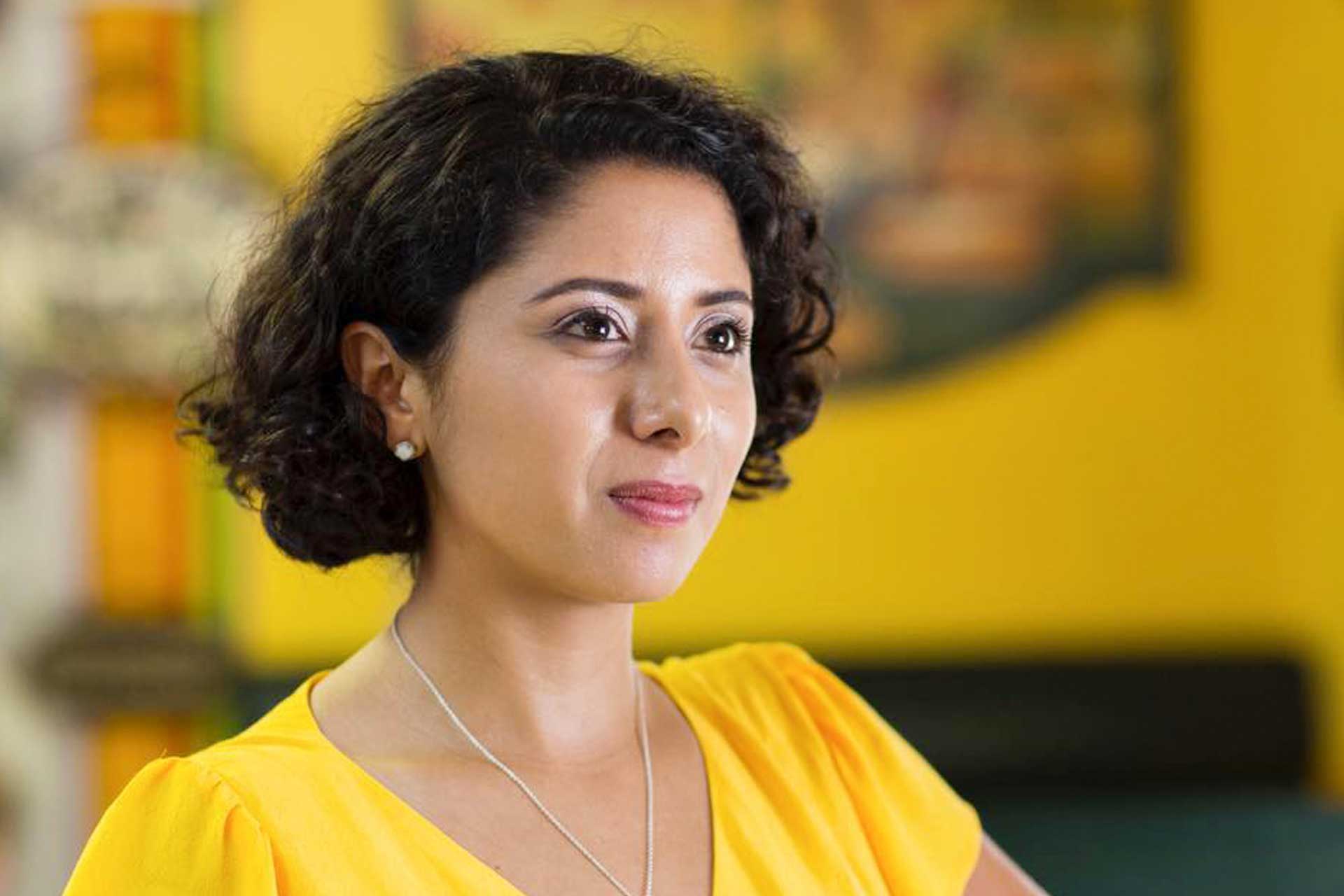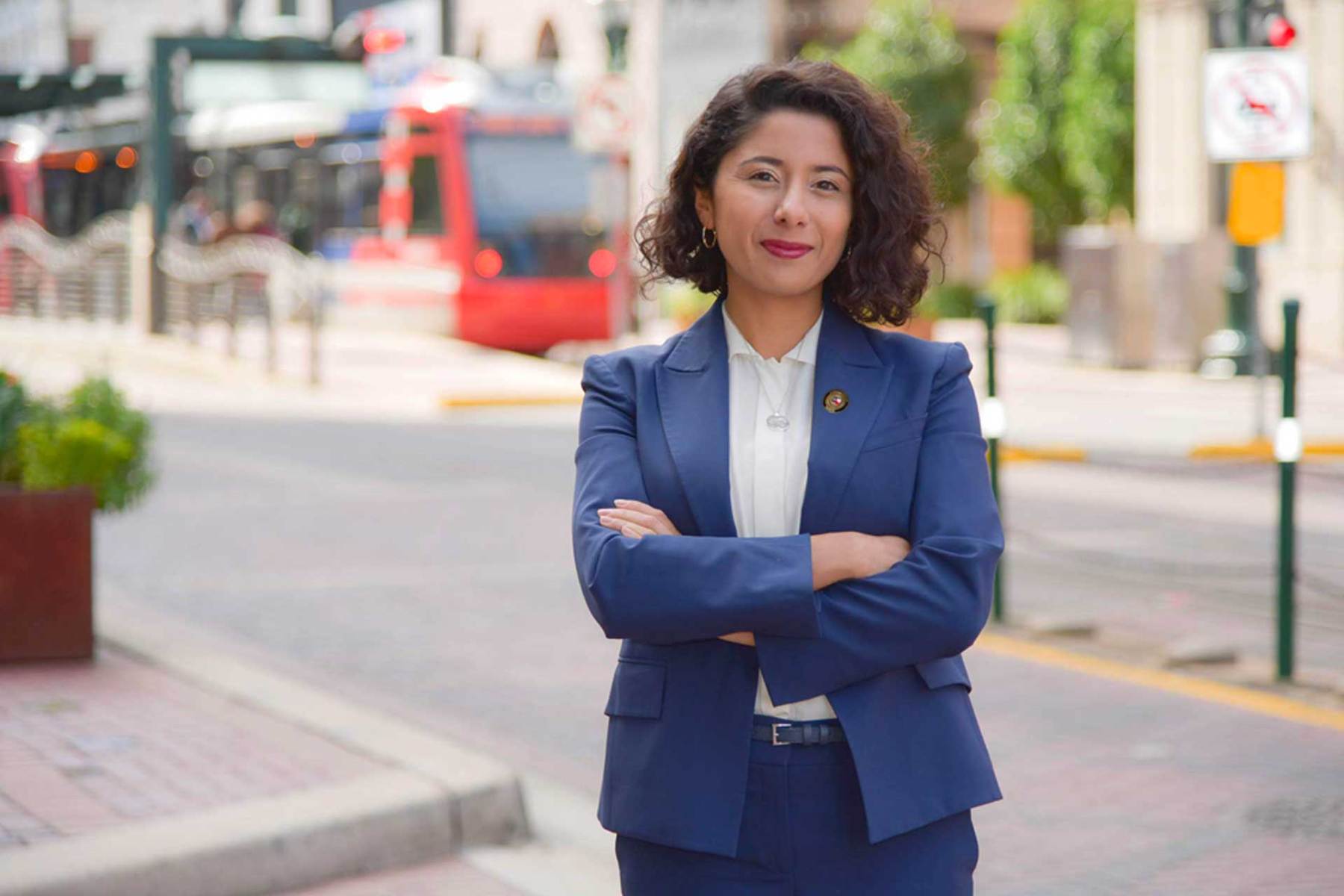Lina Hidalgo is one of the most prominent Latinas in American politics. In 2018, at the age of 27, she was elected Harris County judge, a non-judicial position that functions as the chief executive for nearly five million people in Texas’ most populous county (and the third largest in the country).
Hidalgo was born in Colombia, then moved to Peru and Mexico before her family settled in the Houston area when she was a teenager. Though her rise has been meteoric, she has faced some pushback. One of the first national headlines about Hidalgo centered on a Texas commissioner who criticized her for speaking both Spanish and English at a news conference. “This is the United States. Speak English,” he said. He later apologized after receiving backlash.
The incident is nearly two years old, but Hidalgo said a constituent brought it up as recently as a few days ago, thanking her for speaking both languages. Hidalgo said she wishes she could speak more languages fluently to give remarks in those languages too. More than 145 languages are spoken in Houston, which is located in Harris County.
She entered her position with an international frame of mind. She’s done research in China and Egypt as part of her undergraduate studies at Stanford University. After her graduation in 2013, she worked at a nonprofit in Thailand focused on press freedom: “Hopefully I’m bringing the perspective of a lot of people and just the recognition that there just isn’t one way to do things and it is important and it yields a better result to ask what are the ideas out there and have the humility to accept that your initial thought might not be the right one.”
Now 29, Hidalgo has been bringing that approach to key decision-making about the county’s response to COVID-19. The Houston area, like other parts of Texas, has reported increases in coronavirus cases amid a record number of deaths around the country related to COVID. Doctors and other medical professionals in Houston, home to one of the most comprehensive hospital systems in the world, have dealt with growing COVID-19 hospitalizations.
Hidalgo, alongside officials like Houston Mayor Sylvester Turner, have been front and center in addressing COVID-19 cases and virus-related developments. But Hidalgo noted that Texas Gov. Greg Abbott restricted some of her authority during the pandemic.
Hidalgo talked to The 19th about her experience responding to the virus while addressing issues like criminal justice, natural disasters and voting access.
This interview has been edited for length and clarity.
Barbara Rodriguez: As Harris County’s chief executive and the head of emergency management, you have helped make key decisions about the county’s response to COVID-19 while being one of the public faces of the county. What have been the realities of being in such a prominent elected position during a global pandemic?
Lina Hidalgo: I think one thing that this crisis has done is really shine a light on local elected officials and local government, and in some ways it’s a bit of a silver lining of the crisis. Especially toward the beginning, it fell on us to figure out what the response was. There wasn’t any kind of a roadmap from the federal government, the state government or anywhere else. And so it was basically us local governments trying to get access to the best research and information that we could, exchanging information amongst ourselves and trying to make the best decisions for the community.
That continues to be my focus. But sort of halfway through, [Abbott] removed my authority to enforce the majority of the tools that I had at my disposal … it’s also been really tough, to be able to do something about it — to see positive results in the community, see lives saved, see things heading in the right direction — and then be stripped of authority by a level of government that didn’t itself have a plan.
I know that one of the first actions that got some of the most state and national attention at the time was the fact that in April you required a mask mandate at a time when Republican officials called it a form of government overreach. I’m curious what you think happens when federal, state and local officials are not on the same page about responding to a public health crisis?
I think about, the finish line is in sight, right? On the one hand I’m relieved by that, but on the other hand, I’m concerned about what the current dynamics mean for future pandemics if one were to come to pass, which is not an impossibility. And it is really, really sad to see the extent to which this response has been politicized.
It was black-and-white when we had Hurricane Laura [earlier this year], which was coming full strength up our coast and ended up hitting Louisiana. We had to issue some voluntary evacuation orders and at that time we were back in the usual collaboration with the state and federal government: very objective, very matter-of-fact — all of us are putting out this fire together, and everybody knows their stations and we’re on it. And that’s how the beginning of pandemic response was.
I think what you saw is what happens when you let denial and politics drive public health policy and it’s basically been … conflicting messaging, which leaves the public sort of empty-handed on what they’re supposed to do. I don’t blame the current numbers here or elsewhere on the community. Of course, some folks want to be part of the solution more than others, but some countries have gotten it under control, and we’re just as committed to one another as any other country might be, if not more. And so it’s about the leadership.
There have been a lot of half measures and wishful thinking on the part of the federal government and state government, which have unnecessarily prolonged the recovery from the crisis and has kept us in this loop of premature reopenings, full reopenings — back to crisis, back to square one. And then we’re sort of watching with envy, the areas around the world that have been able to control and contain and have a semblance of normalcy.
You and other local officials around the country are facing growing coronavirus cases and COVID-19 hospitalizations amid the holidays. What kind of actions are you able to implement as an official in Harris County to ensure that you’re able to reduce infections or to ensure that hospitals aren’t overwhelmed? What do you think the state officials should do?
We thought about this a lot, and we looked at the country and the world, and the conclusion is you need a threshold-based strategy. You need to say, OK, once we bring the numbers down to this level, according to a set of metrics — and you look at a variety of them: hospitalizations, positivity rate, cases — and then once you hit that you can reopen a little bit. And then you have another set of metrics farther along, so even fewer hospitalizations, even fewer cases. Better trends. And at that point, you can reopen a little bit more.
The mistake that has been made in the places that are going on this yo-yo from open and close — and in the meantime, thousands of people are dying and getting sick — is that they avert the hospitals being overwhelmed but still have a lot of deaths and hospitalizations, and then they open things.
We can’t have leaders pick whatever metric looks good at a given time. We’ve seen the governor here, he looks at hospitalizations, and once those look bad, he looks at cases. And once those look bad, he looks at positivity rate. It’s constantly bouncing from metric to metric, whichever one he can say things are good or not so bad.
Initially, the county judge is also the director of emergency management in Texas. So, when there’s a disaster, the county executive has the powers of the governor, essentially, in the county. I was able to issue stay-at-home orders, to stop evictions. I had the authority to issue the mask order. I had the authority to require schools close. But then when things became politicized and folks decided that masks were political, the governor said no county can issue any kind of fine for a mask order and he issued an order eliminating the part of the statute that grants county judges our authority. So I no longer have any of that.
Right now my main tool is the bully pulpit and going straight to the community. That’s why we built a threshold-level system, a color-coded system. We shared it with the community. I’m constantly walking through the numbers. We put out a slide deck three times a week with very careful explanations as to where the numbers are, why that’s important and what it means. And then we try and look at creative avenues. So supercharging our contact-tracing program. Micro-targeting our testing. We’ve got a media campaign going and a new one being designed. There’s a tool of a curfew that remains, so we’re looking into that as a very, very temporary and not necessarily good solution, but it’s an option.

People are obviously hopeful that coronavirus vaccines will be widely available in 2021. What role, if any, will you play in its distribution in Harris County? And is there important context here that people need to understand about the next phase of the virus?
The vaccines — and obviously things could change with the incoming administration — but they’re going to go to the state government, and then the local authorities, and we distribute it to our public hospital workers. So we’re working on that. We’re working on getting providers signed up because, from feds to the state government, they give the vaccine to different providers, so we’re working on making sure that folks from all communities are signed up to distribute the vaccines once it becomes really widely available to the public.
And then, of course, the messaging. We need to play a role in making sure folks actually go and get the vaccine, but I’m on a board of folks and we’re in touch with the state about their plan. It’s such a fast-moving situation. But it’s exciting and it’s very positive.
Your election in 2018 was the first time a woman and a Latina were elected Harris County judge. You oversee a budget that’s larger than several states’ budgets, which makes you one of the most prominent Latinas in politics right now. How, if at all, does that identity impact the way you view your job? Do you have any advice for peers who are considering their own run for office?
Yeah. Do it.
I think there’s never a good time. I dropped out of graduate school to run for office. I think it’s great that so many women are participating in politics. I was proud to be part of the wave of women in 2018, and we saw some more this year, and it’s really exciting.
But we’re celebrating the 100th anniversary of the 19th Amendment, and we’re not there yet. I mean we’ve got a vice president-elect who is a woman, but it’s not the president, right? We’ve got quite a ways to go.
We don’t need to be there for the sake of having women, for the sake of having young people, for the sake of having Latinas. Having our perspectives actually brings out better ideas, different ideas, and, for better or worse, we have to be there to demonstrate that our perspectives and our work and our values have something to add. So I hope it’s something that feeds on itself and I think every woman in office, every young person, every person that is somewhat different than the norm, can tell stories like I can of young people coming up to me, parents, little girls saying, ‘You’ve inspired me. I know I can do it.’ I think it’s important for there to be a model and to kind of redefine what an elected official looks like, what a county judge looks like … We should all be able to be county judge if we bring good leadership.
Hopefully I’m opening the door for that, and hopefully also with the changes we’ve made to voting access and to the environment, criminal justice, we’re showing that government is something that you can be engaged with whether it’s voting, whether it’s running for office — whatever it is — that that participation actually yields positive results and positive changes and it’s worth your time.
Harris County is the third-most populous county in the country and one of the most diverse. You lead the county at a time of nationwide frustration over continued racial injustice in many sectors of life, not just the disproportionate effects of the pandemic on Black and Brown people. How do you address those realities? How do you focus on other priorities when the pandemic will continue to be such a key issue going into 2021?
Criminal justice was always important to me since we’ve been in office. I started my career abroad, and I thought I was gonna work in international development. It was the Michael Brown murder [in Ferguson, Missouri,] that ended up sort of helping me realize that there were a lot of things that needed fixing in my own country. So that’s why I came back to the U.S. to start learning about criminal justice issues and got interested in that.
George Floyd, he grew up here, so that was a watershed moment for the community. But we have so much to keep pushing on, so there are things that have fallen off the priority list this year that just had to take a backseat to COVID just because of the realities of there’s limited time in the day and staff.
Criminal justice is something that we’ve continued full force on. We instituted misdemeanor bail reform. We’re working towards having 50 percent of our indigent cases be taken by the public defender’s office. We’re reforming the way counsel is appointed. In our bail reform we instituted into the settlement with the court that there has to be data collection and outside assessment of what’s happening and whether it’s working and what we need to do differently. So there’s sort of a lot of threads going that takes a minute for the fruits of that to be there. But already, for example, the first report on our bail reform came back from the outside monitor, and it says that disparities have decreased and crime has not increased. We’re moving in the right direction.
Voting was another one that we said can’t possibly take a backseat. So where we invested, I think it was like $4 million in elections in 2016, we put around $40 million this year, and we saw record turnout. We did sit down with the team and said, ‘OK, what are the things we just can’t do as much of, and what are some of the things that we really are just going to have to walk and chew gum.’
I saw this headline from a news conference a few weeks ago, where you said of elected officials, “Lead or get out of the way.” Obviously this was about the pandemic, but I’m curious what that says about you and how you lead, and what it might preview about what’s to come for you in the future.
I have a lot of hope for this county. I have a lot of hope for the state. But there are also some very real challenges that were there before the pandemic that are going to be exacerbated by the pandemic.
This country incarcerates so many people. We’ve got extremely high uninsurance rates in Texas, and the state has refused to expand Medicaid — even Oklahoma has done it during the pandemic.
We have just so many needs on education.
So the question is, who’s going to do something about this? Those are issues that have existed for a long time and they’re not going to solve themselves, and in some of those areas, the state is actively making it impossible for us to implement changes. On COVID, they’ve stripped away my authority, so here I am watching people die, day after day. On the environment, the state caps the fines for polluters at $1 million. So you’ve got these massive corporations that pollute with impunity, and all they get is a slap on the wrist. So we’re here suing them for injunctive relief and a court order to order them to stop polluting but it’s not the same, we have to rush to the courthouse so the state doesn’t get there first. So it’s like, guys, we need this place to be a good place to live. We can’t let bad actors get away with impunity because then the good actors are put at a disadvantage. On gun safety, we’re not allowed to so much as ask that people store a gun safely. The state says we can’t in any way have anything to do with how guns are bought, sold, stored, nothing.
So at some point, there are issues that are vital for a strong community, a competitive community and if they’re not going to do it then at least don’t make it impossible for us to do it.







